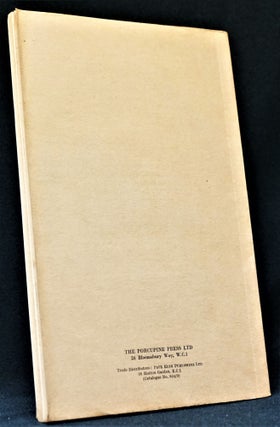A Defence of Poetry & A Letter to Lord Ellenborough
London, England: The Porcupine Press, 1948. First Edition Thus. Softcover. There are few things a scholar or literary person loves more than a good joust on matters of function, technique & taste, of craft, method and mindset. Poets are among the most polemical and notorious, historically, for their combative refusals to be rhetorically de-clawed. Their full-throated public-&-private denunciations of those they understand to be in opposition to The Great Spirit of Poetry—muse-defiling dilettantes who may dip their quills in an inkwell but in essence only dip their toes in that great ocean of poesy—pale in comparison to the depth and ingenuity of their own comparatively superior undertakings. So too was the case for Percy Shelley’s posthumously-released “In Defence of Poetry,” written in 1821 as a direct response to his friend Thomas Love Peacock’s essay “The Four Ages of Poetry,” published by Charles and James Ollier in 1820. Shelley wrote Peacock’s publishers: “I am enchanted with your Literary Miscellany, although the last article has excited my polemical faculties so violently that...I mean to set about to answer it. It is very clever, but I think, very false.” Shelley did not stop there, writing directly to Peacock: “Your anathemas against Poetry itself excited me to a sacred rage...I had the greatest possible desire to break a lance with you...” “In Defence of Poetry” is that very lance, the dragon-like huff of fire from the nostrils and saw-toothed maw of one of England’s finest. His essay ascribes a moral and social function to the poet, an insistence on legislation through life—life and morality as codified by the poet. His understanding that poets could, indeed, take the lead in this manner was brought to life by people like Allen Ginsberg with his landmark publication, Howl & Other Poems (San Francisco, CA: City Lights Books, 1956) in which Ginsberg’s personal rendering of the gay experience as a completely normal, natural sexual function —as opposed to a subversive sleight on the societal and sexuality morality of the nation—helped shift the national discourse in the direction of tolerance, and toward acceptance. In this sense, the Shelleyan function of the poet was made incarnate—and his prophecy shown to be applicable. It should be the hope and aspiration of every poet that this view endures, today. Also included is Shelley's letter to Lord Ellenborough in defence of Daniel Isaac Eaton, an English "radical" who published a periodical titled: "Politics for the People." Eaton was convicted in 1812 for selling copies of Thomas Paine's "The Age of Reason." Shelley's letter calls for such "radical ideas" as all-encompassing freedom of the press, and unlimited tolerance for published opinion, even when false. Ideas humanity is in constant need of re-instituting and strengthening, even today. Book in fine condition with only slight shelf wear to fine-edges; rightmost fine-edge of front cover bending slightly outwards from shelf-wear, additionally; small bump at bottom right-hand corner of same;. Fine. [Item #3725]
Price: $20.00 save 20% $16.00


![[Item #3725] A Defence of Poetry & A Letter to Lord Ellenborough. Percy Bysshe Shelley.](https://thirdmindbooks.cdn.bibliopolis.com/pictures/3725.jpg?width=768&height=1000&fit=bounds&auto=webp&v=1597019643)
